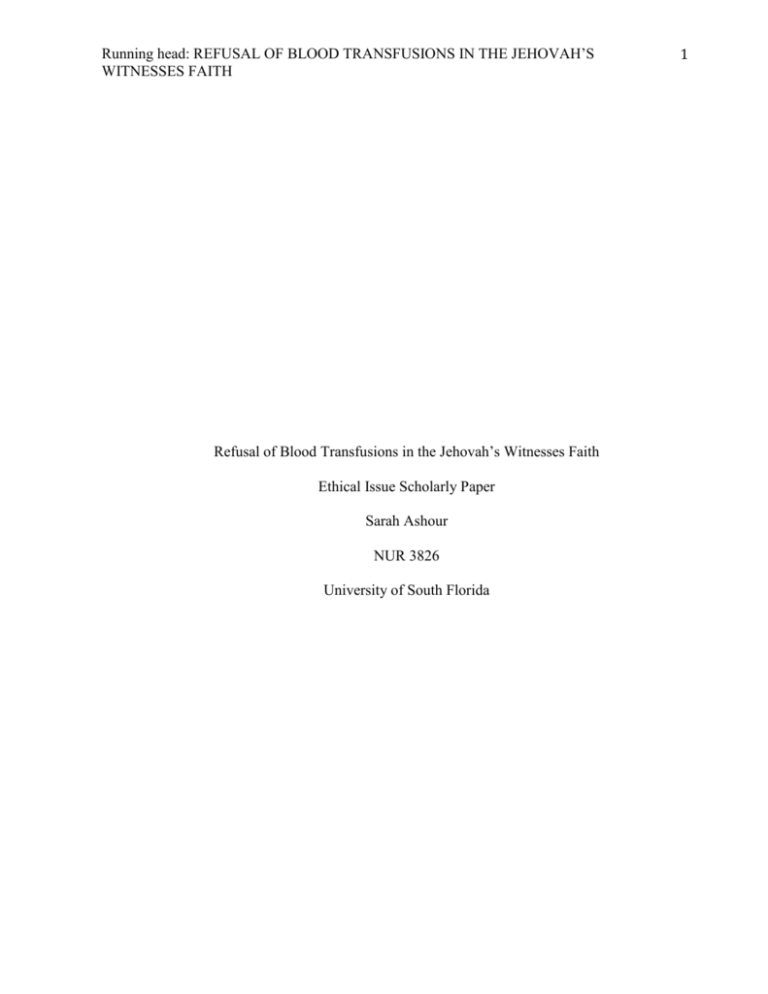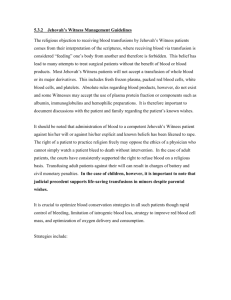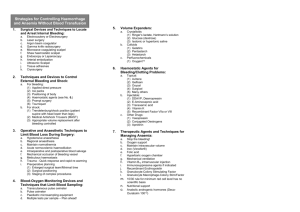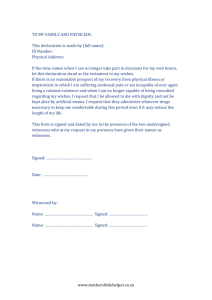File - Sarah Ashour`s Professional RN Portfolio
advertisement

Running head: REFUSAL OF BLOOD TRANSFUSIONS IN THE JEHOVAH’S WITNESSES FAITH Refusal of Blood Transfusions in the Jehovah’s Witnesses Faith Ethical Issue Scholarly Paper Sarah Ashour NUR 3826 University of South Florida 1 Running head: REFUSAL OF BLOOD TRANSFUSIONS IN THE JEHOVAH’S WITNESSES FAITH 2 Ethical Question When discussing the issue of blood transfusion and Jehovah’s Witnesses, an ethical question that may be brought up is, ‘In a life-threatening situation, in which a Jehovah’s Witness refuses a blood transfusion, what is the right action to be taken by the health care provider? Should the decision be based on respecting the patient’s autonomy or be made in accordance with the legal devices that govern practice?’ Refusal of Blood Transfusions in the Jehovah’s Witness Faith Jehovah’s Witnesses is a Christian denomination classified under ‘Restorationism’, in which a Non-Trinitarian belief is followed. This is very distinct from mainstream Christianity. It is commonly known that Jehovah’s Witnesses reject blood transfusion, even in life-threatening conditions (Woolley, 2005). This raises ethical and legal issues that are not easily answered. The question lies on whether individual’s rights outweigh society’s rights, such as the preservation of life and the ethical integrity of the medical profession. The decision surrounding this topic lies among two major groups, the legal system (which we hope medical professionals follow), and the religious group. The state has an interest in preservation of life, however this is not absolute. The Jehovah’s Witnesses society is run by a governing body based in New York, which establishes and controls all doctrines. When an individual joins this religion, he or she must accept all precepts taught without any reluctance and must stay away from independent thinking. If a transgression is made, such as accepting blood, the governing body can suspend religious privileges, censor the individual publicly during meetings, and even appoint them to disfellowship. An example of disfellowship can include amending minimum possible contact with close relatives and avoiding simple greetings between him and people in the religious community (Woolley, 2005). Running head: REFUSAL OF BLOOD TRANSFUSIONS IN THE JEHOVAH’S WITNESSES FAITH 3 From a historical standpoint, Charles Taze Russell founded the religious doctrine of Jehovah’s Witnesses in the United States. Since 1961, the acceptance of blood transfusion was ruled forbidden according to interpretations of scriptures supported by Genesis and Leviticus and Acts 15:28, 29. The punishment for the willing acceptance of blood transfusions was expulsion from the religion. This refutation goes back to interpreting biblical texts, in which it states that the assimilation of blood in the organism by the mouth or veins would violate God’s law. This also includes abstaining from meat in consideration that it has a soul. This affirms that the human being’s soul lies in the blood and, as such, it cannot be passed on to another person. If a transfusion occurs, the individual would disobey the commandment of loving God with all of his soul (Franca, Babtista, & Brito, 2008). When describing ethical philosophies, we recognize the meaning of two philosophies, Theist and Humanist, and how they can relate to an ethical issue. In the case of Jehovah’s Witnesses and blood transfusions, it can easily be classified as Theistic. This category is defined by three characteristics: Reality and morality are ordered by a higher power, absolute and fixed standards exist, and lastly accountability. These characteristics are similar to Jehovah’s Witnesses, in that orders are overtaken by a higher power and that fixed standards exist. Theism includes three controlling philosophies, Hippocratic Tradition, Natural Law, and Judeo-Christian (Guido, 2010). Ethical principles, as they relate to the topic of blood transfusions and Jehovah’s Witnesses, can be compromised or challenged by the principles of autonomy, beneficence, nonmaleficence, and justice. Autonomy relies on the foundation of informed consent. It is related to self-determination, which means patients have the right to receive informed consent and to accept or refuse treatment even if those treatments are life saving. This is directly related to the case of a Jehovah’s Witness Running head: REFUSAL OF BLOOD TRANSFUSIONS IN THE JEHOVAH’S WITNESSES FAITH 4 refusing a blood transfusion. According to autonomy, it is their right to refuse the transfusion. However, even with that said, there have still been many ethical dilemmas related to Jehovah’s Witnesses in accordance with the situation in hand (Guido, 2010). Beneficence is related to doing “good”. This sets a challenge because it is difficult to define what good means and when something is good. Beneficence must be balanced against respect with autonomy. For example, a doctor might think he is doing good by ordering a blood transfusion to an unconscious Jehovah’s Witness patient, rather than taking away from the patients right of autonomy (Guido, 2010). Third, nonmaleficence, is the principle approach of avoiding doing harm. It includes 5 rules: Do not kill, do not incapacitate others, do not cause pain or suffering, do not cause offense to others, and do not deprive others of the goods of life. This also goes back to including a balance of autonomy. In relation to rejection of blood transfusions in Jehovah’s Witness Patients, the question of whether or not we are avoiding doing harm raises a dilemma. Are we respecting the patient’s autonomy or are we depriving the patient of the ‘goods of life’? (Guido, 2010). Lastly, the ethical principle of justice relates to equitable distribution, and includes benefits, burdens, and scarce resources. It is to ensure fair opportunity and equality of access. In relation to rejection of blood transfusions, it may be important to discuss alternatives with the patient and allow for fair opportunity and open discussion of options if possible (Guido, 2010). The ANA Code of Ethics also plays a vital role in this key ethical issue. The codes of ethics are statements that serve to articulate the values and belief of a given discipline. It serves as a standard for professional actions and reflecting the ethical principles shared by its members. The ANA code of Ethics serves the purpose of stating the ethical obligations and duties of every individual who enters the nursing profession, lists the nonnegotiable ethical standard, and is an Running head: REFUSAL OF BLOOD TRANSFUSIONS IN THE JEHOVAH’S WITNESSES FAITH 5 expression of the nursing own understanding of its commitment to society (Guido, 2010). The first three provisions of the code address fundamental values and commitments. The next three provisions address loyalty and one’s duties, and the final three provisions address the obligations and duties beyond individual nurse-patient encounters. Provision 1.4 states the right to self-determination. As discussed before, it is the patient’s right to refuse treatment, in this case a blood transfusion. The nurse has an obligation to be knowledgeable about the moral and legal rights of all patient’s to self-determination and to preserve and protect those interests by assessing the patient’s comprehension of both the information presented and the implications of his/her decision. Provision 3.5 discusses acting on questionable practice. As an advocate for the patient, the nurse must advocate for the ethical and legal rights of the patient, and must be alert to take appropriate measures regarding any action that places the rights of the patient in jeopardy. For example, if a nurse were aware that an unconscious Jehovah’s Witness patient, who needed blood, had mentioned prior that he was completely against receiving a blood transfusion, and the doctor orders a transfusion and states his job is to save the patient, as a nurse it would be an ethical and legal duty to speak out and refuse for the treatment to occur. It is critical to remember that the nurse is accountable for the quality of nursing care given to patients (ANA, 2001). In conclusion, the belief in autonomy of the patient is very critical when discussing rejection of blood transfusion from a philosophical standpoint. Although beneficence and nonmaleficence are also important philosophical approaches, in my opinion they do not mean anything if the patient has already stated refusal of a certain treatment. You are no longer “doing good” or “avoiding harm” if that is not what the patient wants. In relation to the ANA Code of Ethics, the patient has a right to self-determination, and as an advocate should be able to respect the patient’s decision, thus decreasing the chances of moral distress. Running head: REFUSAL OF BLOOD TRANSFUSIONS IN THE JEHOVAH’S WITNESSES FAITH References American Nurses Association (ANA) (2001). Code of ethics for nurses with interpretive statement. ANA: Washington D.C. Franca, I. S., Baptista, R. S., & Brito, V. R. (2008). Ethical dilemmas in blood transfusion in jehovah's witnesses: A legal-bioethical analysis. ACTA, 21(3), 498-503. Guido, G. W. (2010). Legal and ethical issues in nursing (5th ed.). Upper Saddle River, N.J: Pearson. Woolley, S. (2005). Jehovah's witnesses in the emergency department: What are their rights? Emergency Medicine Journal, 22, 869-871. 6 Running head: REFUSAL OF BLOOD TRANSFUSIONS IN THE JEHOVAH’S WITNESSES FAITH Criteria: Scholarly Paper Grading Criteria Clearly present an ethical issue that is relevant to nursing as a profession. E.g. Use of medical marijuana. Describe issue clearly; use a minimum of four references. 30 points Describes what ethical principle(s) is/are being compromised or challenged. 20 points Write a conclusion as to how this issue can be addressed using ethical principles and moral reasoning. 30 pts. Uses good grammar, spelling, punctuation, and sentence structure. 10 points APA format followed throughout paper. Uses intext citations throughout text accurately. Prepares reference list according to APA format. Attaches copy of rubric to final page. Correctly labels file with last name. (Last name. NUR3826paper) 10 points Points Earned 7







